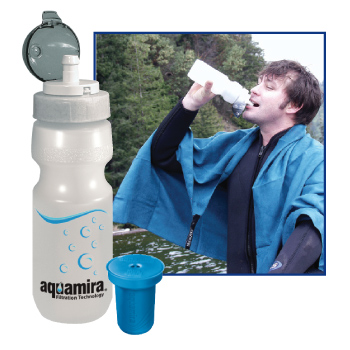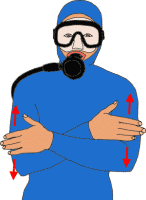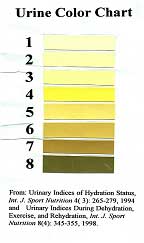Dehydration:
The Loss of Water and Salts essential for normal Body Function
|
As I am sure most of you know, our bodies are made up of 70% water but did you know that even a 2% loss of water in the body can result in up to a 10% reduction in physical performance due to dehydration. The muscles do not work well, which can leave you vulnerable to a variety of injuries.
This is an especially important consideration for Scuba Divers, as dehydration can affect the body’s ability to off-gas, provoking DCS (Decompression Sickness), increased fatigue and, in extreme cases, Hypovolemic Shock, which is also known as Physical Collapse.
Staying hydrated is a balancing act between the body fluids and the essential salts in the cells and blood plasma that play an important role in the proper functioning of the human body. When the body loses more fluids than it takes in, dehydration occurs. There are a number of factors which can contribute to this phenomenon, such as illness, hot dry climates, prolonged exposure to heat or sun and insufficient fluid intake or the use of diuretics.
As Divers, there are 4 main ways that we lose fluids. We discuss these now. |
Sweat
When Divers go Diving, we exert our bodies. There is heavy equipment to lift and putting on a wetsuit has never been the easiest activity in the world. Once kitted up, a diver then has to reach the entry/exit point and the route is often demanding; over rocks, down hills etc. Even on the coldest day, this exertion can cause a diver to sweat and as a result lose moisture.
An important part of sweating is the loss of ionised salts (mainly Sodium (Na+), Chlorine (Cl-) and Potassium (K+)) called electrolytes in the body. These electrolytes control the amount of water in various parts of the body and maintain the electrical gradients across the cell membranes, by which, nerves conduct signals through the body. These signals are what make the glands work or tell a muscle to contract (including the Heart Muscle).
When Divers sweat, we lose electrolytes. One litre of sweat can contain up to 1.5g of Sodium and in extreme cases, a Diver can lose up to 3 litres of sweat in an hour. This loss is one of the body’s mechanisms for regulating salt levels- if we did not sweat electrolytes, just water, the concentration of electrolytes in the blood would quickly rise and could result in death. The concentration of the electrolytes in the sweat is less than that of the blood and so, if we are sweating over a period of time, the blood does become ‘thicker’ and this is the reason that we need to drink water when we are sweating (to thin it).
Drinking is not the only factor in maintaining a Diver’s Hydration. If a Diver is sweating and drinking water but not eating, this can deplete the reserves of electrolytes and result in a sodium deficiency, which is also known as Hyponatremia. This condition can be fatal but it is an extreme case scenario and is almost never a concern for recreational divers. |
 |
Breathing
Have you ever breathed on a mirror?
If you have, you will have noticed that the mirror fogs up under your breath and there is a residue of moisture left on the face of the glass. This is a result of moisture being drawn from high concentrations(the body) to areas of low concentration(the mirror) in much the same way as heat is drawn from warmer areas (Diver’s body) to cooler areas (the water column) and Nitrogen dissolves into our bodies under pressure.
When we go Diving, we have our tanks filled by a reputable source where the air pumped into the tanks by the compressor is filtered to remove anything that isn’t supposed to be there. If your local filling station also mixes Nitrox through Partial Pressure Blending, you may find that the air is double or triple filtered due to the added risks of working with pure Oxygen. Although this filtration system is necessary, it causes the air in our cylinders to be very dry.
Breathing dry air from your cylinder will contribute to a Diver’s Dehydration. As the Diver breathes the air into the lungs, moisture moves from the body into the air to saturate it (sound familiar? Think
 |
about decompression theory) and the dry air from a Scuba Tank requires nearly twice as much moisture from the body to saturate it than breathing uncompressed air from the atmosphere.
It is usually found that this has more impact in cold water as the body has to relinquish more moisture for the lungs to warm the cold air.
In 2003, BSAC (the British Sub Aqua Club) released an Incidents Report that listed Dehydration as a contributory factor in Decompression Sickness Incidents particularly among Drysuit Divers in the UK, showing that Dehydration in Divers is not simply something that affects Divers in Tropical regions. |
Urinating
The Human Body is designed for the environment in which we live. You will often hear non-divers say, if we were meant to be in the water, we would have been born with gills.
As a passionate Diver myself, I find that I cannot agree with that statement completely. Scuba Diving makes me weightless and free. I can forget any worries from the surface. They just don’t seem to matter so much while I am interacting with the sea life and visiting this world that so few people get to visit. Surely, this is how life is supposed to be. However, I cannot argue with the fact that my time is limited because I am reliant on Diving technology and limited air. Also, from the second I entered the water, my bladder has been screaming at me that I need to go.
| It is not just your mind playing tricks on you. Our bodies were in fact designed for an environment with gravity so when we move to a weightless environment like underwater (or outerspace), our regulatory systems become confused.
On Land, blood pools in the extremities, slowed by gravity. Underwater, the blood is allowed to return to the Diver’s centre, tricking the body into believing that the blood volume is too high. The Diver’s body actively works against them to reduce the blood volume. The Heart responds by triggering a response in the kidneys to remove fluid. This means the Diver needs to pee more and more often. This effect is called Immersion Diuresis or in simple terms The Spaceman Effect. |
 |
This Spaceman effect can become more pronounced as a result of the water temperature. Unless the water is at the same temperature as the Diver’s body temperature, Vaso constriction (narrowing of the blood vessels) occurs. This reduces blood flow to the extremities and works to increase the blood volume at the body’s core thereby compounding the problem.
 |
Add to the equation the alcohol that was consumed the night before, the coffee(s) drank this morning in a bid to wake yourself up and the several cups of tea you have had since (just to stay warm). These things are all known as Diuretics and the list even includes Chocolate. Unfortunately, if you want to avoid Dehydration on your Dive, you will have to avoid these things to. |
Often Divers complain of headaches on surfacing after a Dive. Insufficient fluids in the blood vessels of the neck and head can cause headaches and so this is usually a symptom of Dehydration.
When blood flow is compromised in a Diver, it can have serious consequences from a decompression point of view. Off-gassing is dependent on the flow of blood and gas exchange to remove the Nitrogen dissolved in the blood stream. Dehydration can cause the restriction of blood flow to the muscles and this, in turn, restricts the body’s ability to remove the dissolved Nitrogen putting the Diver at increased risk of a ‘bend’.
Illness
I am sure most of us have been on a Diving Trip or holiday and reach the second or third day to be struck by the dreaded tummy bug.
Scuba Diving when you are not feeling well is never wise but if you are suffering from vomiting and diarrhoea you could be risking serious Dehydration.
How do I stay Hydrated?
Dehydration is a significant factor for Divers and all Divers are usually suffering from some degree of Dehydration when they finish a Dive. Just getting into sea water alone has a Dehydrating effect, as a result of Osmosis.
The concentration of salt in the sea is so much greater than that of our bodies that the moment we enter the sea it begins to draw moisture out of our body to try and achieve saturation, thereby Dehydrating the Diver.
This same principle applies to drinking sea water. Even though it contains so much water, the high concentration of salts in the sea means that if a Diver were to drink it, the body would have to work to regulate the increased levels of salt in the body. This triggers the kidneys to eliminate the excess sodium with the Urine but the water required to eliminate the salt in this way exceeds the amount that was in the sea water in the first place. As a result, the Diver would Dehydrate.
As a point of interest, there are some sea birds that can drink sea water (such as penguins) but these birds have special excretory glands in their heads that eliminate the excess salt.
To remain hydrated, a diver must ensure a slow gradual intake of fluids for up to 2 days before a Dive and this should include at least 2 litres of water per day. Generally, a person finds they are more Dehydrated in the mornings and so on the day of Diving, should aim to drink half a litre in the morning, then 250ml before the Dive and at least a litre after the Dive or between Dives to replace the fluids lost.
Do not wait until you feel thirsty before having a drink. At this point you are already mildly Dehydrated. It is best to drink small amounts often throughout the day even if you do not feel thirsty and to drink more than you think you need.
Equally, it is important to avoid over drinking. When too much water is drank over a short period of time, it can have the effect of diluting the concentration of electrolytes (salts) in the body and the body in turn, makes you urinate more with extra water and turns off the thirst sensation to try and restore the balance. This usually means you stop drinking and risk Dehydrating.
| To avoid this ‘flushing’ effect, it is advisable to drink a solution containing electrolytes and there are numerous sports drinks on the market today which offer this. Electrolyte levels in sports drinks are similar to the concentrations released in sweat, which means that you do not have to dilute them and they will not cause dehydration. The primary advantage of a sports drink is that the electrolytes will reduce urine production during the Dive and minimise the Diver’s need to go.
Often, drinking 750ml of warm water with 6 teaspoons of sugar and half a teaspoon of salt dissolved in it will have the same effect as the sports drink, although the taste may leave something to desired. |
 |
To prevent Dehydration when Diving
• Drink plenty of non-diuretic fluids
• Avoid Alcohol and Caffeine
• Eat mineral rich foods such as Bananas, watercress and mushrooms
• Breathe in a slow and relaxed manner
• Avoid exertion
• Conserve body heat
• Stay out of the Sun and seek shade on hot dry days
• Take precautions to avoid sea sickness and tummy bugs (if this means taking a weeks supply of pot noodles, so be it)
• If doing long dives, take some in-water rehydration such as SCUDA (self contained underwater drinking apparatus) or foil drink packs to sip on decompression/safety stop
• If you are a technical dry-suit diver invest in a peevalve or towels for those long dives when you really have to go.
• Consider diving a Rebreather, which circulates warm moist air reducing the dehydrating effect
• Check your urine. The colour should be pale, it should be plentiful and odour free. If the colour gets dark or it gets smelly you could be dehydrated.
• Use Common Sense
by Shelley Patient @ Scuba-Tech Diving Centre, Cyprus

